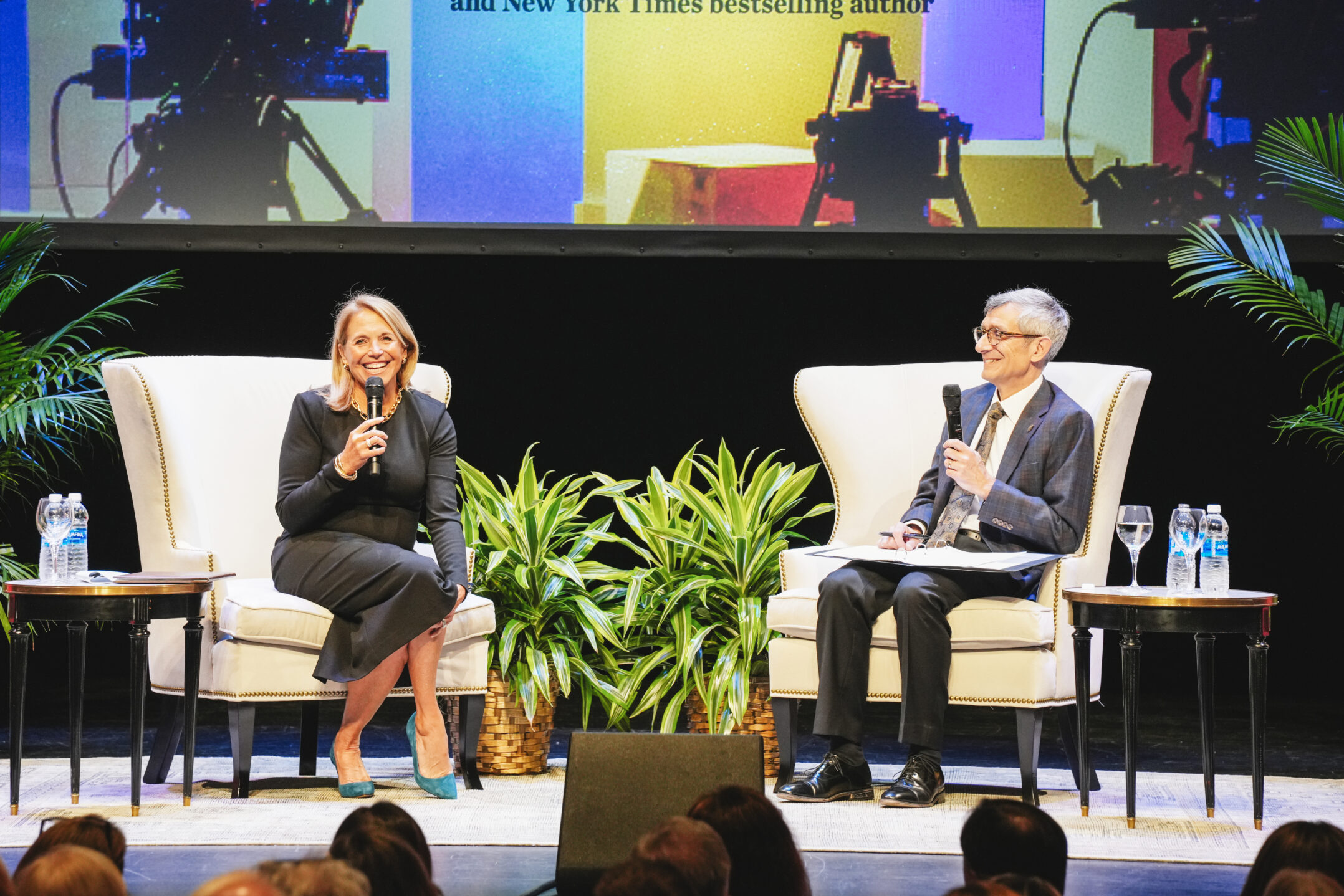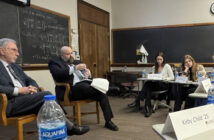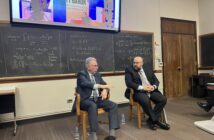To kick off this year’s Compelling Perspectives series, Lehigh students, faculty and staff were invited to attend a discussion between Katie Couric, award-winning journalist and New York Times bestselling author, and President Joseph J. Helble on Tuesday.
The founder of Katie Couric Media — a multimedia news and production company — and author of the daily newsletter, Wake Up Call, brought her perspective on the role of media in contemporary society, the series theme for the 2024-2025 academic year.
Couric’s cancer advocacy
To open the discussion, Helble asked Couric about her late husband, Jay Monahan, who lost his battle to stage four metastatic colon cancer at age 42 in 1998.
Couric described this as a life-shattering experience for her and her 6- and 2-year-old daughters.
A year after his death, Couric visited Lehigh for the first time as the 131st commencement speaker. During this time, Couric began thinking about using her platform to become a cancer advocate.
“After Jay died I realized I had this platform, which was the Today Show, and it would be criminal if I didn’t share what I had learned during that experience,” Couric said.
She said her goal was to turn “pain into purpose.” So, she received a colonoscopy that aired on The Today Show to spread awareness about the importance of colon screening. Couric, who was diagnosed with breast cancer two years ago, shared what she has learned about the disease with the audience and emphasized the importance of proper screening.
Today’s media landscape
Couric said she feels the media industry is different than it was 20 years ago because there were limited numbers of organizations and individuals creating content and dispersing information.
She referred to the landscape two decades ago as “such a different environment,” and said today, there are “media ecosystems where we’re getting affirmations instead of information.”
Helble referred to Pew Research’s 2024 News Platform Sheet and said the numbers point to a nearly impossible road back to what news used to be.
According to the research, 86% of U.S. adults say they at least sometimes get news from a smartphone, computer or tablet, and 57% say they do often.
Couric said the viewership of television news has gone down in recent years as social media has rapidly expanded.
There is “a tsunami of information online,” Couric said. “Everyone is (a) gatekeeper.”
As many of the guardrails for disseminating information have evaporated, Couric said it can be difficult to discern if what you’re reading is factual.
She said even opinion and commentary posted online are seen as news by many, and much of the responsibility to find the truth relies on the consumer.
“The media landscape has changed so much, and I think you have to be a really discerning consumer of information,” Couric said.
Couric said people must be smarter about what news they are consuming, who they are hearing it from and what motives they may have to even say it. To improve her own media consumption, Couric said she intermittently switches between watching Fox News and MSNBC to compare how each outlet frames different events.
She looks for corroboration between sources and said though it’s time-consuming to dive deep into the stories she’s following, it’s necessary in today’s political climate.
She said she urges students to read a wide array of stories.
Despite her diligence, Couric said she experiences trouble finding her way in the new media landscape and finds it hard to have a conversation where nuance is involved.
She said binary thinking is taking over the country and this type of thought limits the amount of face-centered conversations with people.

President Helble (right) interviews award-winning journalist Katie Couric as she kicks off the 2024 Compelling Perspectives ceremony. The ceremony took place in Baker Hall on the evening of Sept. 17. (Courtesy of Lehigh University)
Generative AI in journalism
The line between potential advantages — productivity and innovation — and risks — inaccuracies, ethical issues and undermining public trust — generative AI could have in journalism are up for debate.
Helble and Couric discussed the roles generative AI could play in the field, and Couric said she believes no one knows the impact it’s going to have.
She said as professionals now attempt to figure out if AI is “our friend or our foe,” the media business model has already been disrupted by digital media.
She said one consideration is columns, as people would likely read a piece written by someone with real experience and insights, rather than a robot.
“They’re saying that they’re going to be teaching (AI) to have feelings and emotions and all that, but I still believe that you need a thinking feeling human being,” Couric said.
Couric said she hopes AI can be added to the field to look at trends or statistics, but humans are necessary for real reporting. She said humans can be physically on-site talking to people, so she is hopeful AI will be added to help, not used as a replacement.
The current political environment
In light of last week’s Presidential Debate between Vice President Kamala Harris and former President Donald Trump, Helble said factual reporting comes into question again. Acknowledging the difficulty of fact-checking in real time, Helble asked Couric how journalists balance the need for fact-based reporting while also striving to remain unbiased.
Couric said she’s tried to be fair her entire career. During a 2008 interview with Sara Palin, the Republican vice presidential nominee at the time, Couric said she attempted to capture Palin’s knowledge on topics important to the public while also being straightforward and asking tough questions.
Though most saw her reporting as unbiased at the time, she doesn’t think it would be possible to interview that way in today’s political and media landscapes.
“I just don’t think it would have that impact because I think trust in the media has declined so precipitously,” Couric said.
According to a study by Pew Research, political divisions are now on a singular axis where there’s no place for a common cause or collective national identity.
“We have lost our sense of being the United States instead of the ‘divided states’,” Couric said.
Reactions to the discussion
Emma Wright, ‘25, attended last year’s Compelling Perspectives discussion with British politician Theresa May, and said Couric’s demeanor was more lighthearted compared to the serious tone of May’s.
She also said the topic of contemporary media felt relevant to today’s political climate.
“With the issue of media, especially after the debate, I think it was super helpful to hear a professional’s opinion,” Wright said.
Wright said Couric’s emphasis on finding factual news and dedicating time to researching various sources in the news is something she will practice in the future.
Mandi Alford, graduate recruitment and communications manager, attended the event with her husband Fred Alford. She said there’s so much disinformation out there, so it’s often difficult to know if what you’re reading is accurate or reputable.
Mandi Alford said she thinks it’s great Couric does her own research when consuming media, but not everyone has the time to do so.
Fred Alford said individuals tend to seek information that reinforces what they believe in, instead of what is factual.
He also said one of the biggest threats to the country is the loss of the truth.
“If we lose the truth, we’ve lost everything,” Fred Alford said.
Another attendee, Cosi Kymissis, ‘25, said when Couric was discussing contemporary media she wasn’t as negative as she thought she would be.
“She shared more about how to control your own life, whereas people usually are like ‘Social media is ruining everything,’” Kymissis said. “I appreciated that a lot and thought it was very refreshing.”
Kysmiss said she admired Couric’s respect for other people and their opinions, especially in the polarized state of society, which she thinks is what the Compelling Perspectives series is all about.
Mandi Alford said she wanted to attend because she has been a fan of Couric’s for years.
She thought Couric highlighted important points, and it was powerful to hear what she had to say.
“I think she comes across as very authentic, and she has the experience to back that,” Mandi Alford said.
According to the program’s webpage, Compelling Perspectives’ goal is to foster respectful discourse and engagement regarding issues of critical and societal importance, as the “consideration of alternative viewpoints helps to promote critical thinking, empathy and openness.”
The second of the program’s three speakers for the 2024-2025 year is Marty Baron, a retired journalist and former editor of The Washington Post, who will be speaking at Lehigh in December.






Comment policy
Comments posted to The Brown and White website are reviewed by a moderator before being approved. Incendiary speech or harassing language, including comments targeted at individuals, may be deemed unacceptable and not published. Spam and other soliciting will also be declined.
The Brown and White also reserves the right to not publish entirely anonymous comments.